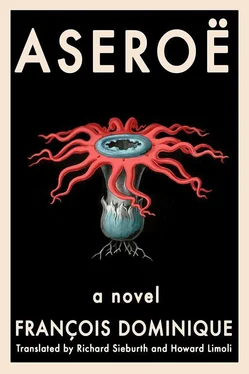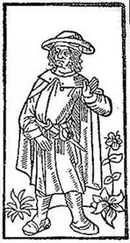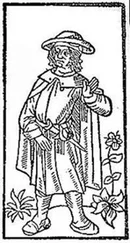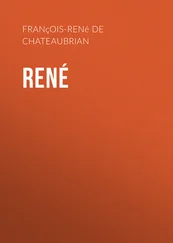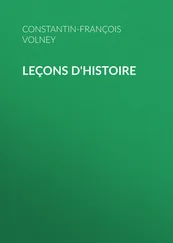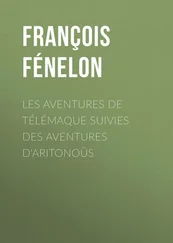François Dominique - Aseroë
Здесь есть возможность читать онлайн «François Dominique - Aseroë» весь текст электронной книги совершенно бесплатно (целиком полную версию без сокращений). В некоторых случаях можно слушать аудио, скачать через торрент в формате fb2 и присутствует краткое содержание. Город: New York, Год выпуска: 2020, ISBN: 2020, Издательство: Bellevue Literary Press, Жанр: Современная проза, на английском языке. Описание произведения, (предисловие) а так же отзывы посетителей доступны на портале библиотеки ЛибКат.
- Название:Aseroë
- Автор:
- Издательство:Bellevue Literary Press
- Жанр:
- Год:2020
- Город:New York
- ISBN:978-1-942658-78-8
- Рейтинг книги:5 / 5. Голосов: 1
-
Избранное:Добавить в избранное
- Отзывы:
-
Ваша оценка:
- 100
- 1
- 2
- 3
- 4
- 5
Aseroë: краткое содержание, описание и аннотация
Предлагаем к чтению аннотацию, описание, краткое содержание или предисловие (зависит от того, что написал сам автор книги «Aseroë»). Если вы не нашли необходимую информацию о книге — напишите в комментариях, мы постараемся отыскать её.
Aseroë — читать онлайн бесплатно полную книгу (весь текст) целиком
Ниже представлен текст книги, разбитый по страницам. Система сохранения места последней прочитанной страницы, позволяет с удобством читать онлайн бесплатно книгу «Aseroë», без необходимости каждый раз заново искать на чём Вы остановились. Поставьте закладку, и сможете в любой момент перейти на страницу, на которой закончили чтение.
Интервал:
Закладка:
Why this sudden aversion? His manner, his features seemed amiable enough, and on some other occasion I might have found this passerby pleasant enough. His face was almost handsome, and seemed unmarked by any trace of suffering or illness. I like most faces, as long as they are not looking at me askance. I have, of course, had occasion to encounter faces burned out by lies or by the lust for power; and I have met with other faces corrupted by hatred. But this was not the face presented by this stranger. He cast me a look that was foreign to this world. In fact, he cast me the absence of any look—and it is the memory of this that turns my blood cold. And yet this look seemed almost familiar to me. It was as if over a period of many years I had become inured to this level of horror.
It was difficult to admit, but I had just bumped into someone utterly repulsive, a creature lacking any humanity. This idea disturbs me, for when I was young I used to clip newspaper photos of murderers, of torturers, or of notorious tyrants, which I then mixed with photos of scholars and artists. I noticed then that, when taken out of context, the names attached to these various faces could be interchanged without their features thereby needing to be modified. Having just written that this man was “a creature lacking any humanity,” let me admit that I am sure of nothing of the sort. He could have just as well been an angel as a devil.
It is both the fear of the unknown and the sway of common prejudices that causes us to abandon our curiosity and to see only grimacing ghosts instead of human beings possessed of no other magic than their strange appearance. Would this account for our hallucinated visions of the war-painted faces of rival tribes, of the maws of carnivores, or of the plague-stricken unfortunates who wander from one town to the next with their walking sticks, their bells, and their masks of crows? Organic transformations can prove to be just as fearsome: serpents sloughing off their skins, the mating rituals of insects, or scenes of birth whenever witnessed at close hand—the infant with his eyes glued shut, his hair stuck to his deformed forehead, his mouth contorted and then shrieking out at life, more grotesque than a death mask.
The bestiaries of old and the chronicles of the first explorers communicate to us the panic experienced when one is confronted by some unknown species. Pliny the Elder says that the catoblepas , located at the sources of the Nile, is a midsize beast whose gait is lazy and whose head is so heavy that it cannot carry it on high—the head simply droops earthward and drags in the sand. The author adds that this particular infirmity is a boon for humans; otherwise, they would succumb to its murderous gaze. It’s possible Pliny was libeling a mere South African gnu, but what am I doing with my poor stranger? Am I treating him like another catoblepas? Or like some humanoid or mutant? How does the repulsion he inspires in me differ from the most common garden variety of xenophobia?
Over the course of my life, I have seen faces ravaged by fire, others by the butterfly rash of lupus. I shall never forget the pocked faces of the lepers I saw in northern Bamako, near the river Niger. I wouldn’t use the word repulsive to describe a single one of them. If my stranger were to cross my path again, I would not dub him “a creature lacking any humanity.” This spiteful observation, which haunted me that December evening and in the months that followed, now makes me feel ashamed. Because I know that this face could have been my own.
During the whole day that followed this encounter, I was ill, incapable of doing anything. My passionate negation of a person about whom I knew absolutely nothing caused me to throw my own well-being into question. By trying to cast this encounter into words, by trying to somehow name it, wasn’t I getting off on the wrong track? I’m not saying this out of any pretense toward artistic sensibility: I mean what I say. I am overwhelmed when I think of the final madness of Friedrich Nietzsche. I can see him throwing himself in tears upon the neck of that beaten horse in Turin. I hear these words; they stagger me:
Parched
By the truth,
Do you still remember,
Do you still remember,
O burning heart,
The thirst you felt back then?

That December evening, I sensed that the train of thought that had been opened by the Anthurus archeri —that is, by the “devil’s fingers” in the form of Aseroë —needed to be brought to a close or else to change in such a way that the words at my disposal—designating not only a very ancient form of life but also an originary lightning strike—would have to undergo a violent crisis. This time, I feared I was confronting a trial beyond my capacities. The frank indifference of the stranger, which was equal to my indifference to the hurrying crowd, did not lie at the source of my disarray. I know that our laziness causes us to simplify the faces we see. Wasn’t it I who, jostled by a passing stranger, neglected to register the details of an ordinary face, reducing it to a few summary odious features that served my purpose? I was imparting a false appearance to it—a convenient mask of Otherness.

The late afternoon of July 21 (my birthday) found me sprawled out on an armchair in front of the television. There was a very cheerful master of ceremonies hosting a strange game: the television audience, men and women alike, had been invited to create on live TV the stylized portrait of their ideal man and woman. While the women described over the telephone (you could hear their live voices) the features of their dream man, a computer recorded their votes as to some detail or another, and from this collection of desires the machine averaged out the features, which were then gradually projected onto a giant screen. The technique of the “robot portrait” (or “Identi-Kit”), invented by the police to profile potential suspects, here found its televised application. In my mind, I saw the rather handsome creature who was being here suggested: he could have been a reporter or a young CEO or the master of ceremonies himself—who did not fail to point out, in jest, his close resemblance to the media meme of the ideal man that had just been computer-generated.
Suddenly, as the eyes were finally being drawn in on the computerized portrait, I saw my passerby of December emerge from the intense light. His inhuman face, his stylized features were henceforth more than probable. I imagined the proliferation of these clones. Statistical indifference having become the norm, there was only one step left to be taken in these times of crisis and generalized panic. Only racist violence could resolve this nightmare into broad daylight. Any statistical deviation from the norm, as slight as it might be, becomes a handicap for the victim. This process of “othering” is propagated slowly and insidiously—every day a little more—and generates its own crop of wops, coons, wogs, or gooks in every city, in every district, in every family. The desire to eradicate the half-breed, the métis, to eliminate the Other from the circle of the living—an absurd but entirely realizable proposition—will express itself more distinctly over the media. How modern: to smile at the very strangers you want to eliminate.
I looked at myself in the mirror. I’ve been affected; my appearance has changed. Words, having lost their individuality, fail to express my disarray. I thought enviously of that Australian tribe that created a new word each time one of its members disappeared. Whereas with us, language under the impress of the various media undergoes an opposite fate: at each birth, another sentence disappears. Language will disappear by attrition. Already, during the night, personal pronouns suffer from anemia: the penury of nouns and verbs forces them to slash each other to ribbons. Every morning, in front of the mirror, the faces tormented by this nightly combat remake a mask for themselves. It’s vitally important to remove, as much as humanly possible, any personal emotion. Gone are distant gazes, the tentative inquiries. Competitions, stereotypes, knee-jerk reactions, sound bites, blogs, tweets, tabloids, sports, video games, and, from time to time—like the attacks of malaria every four days—hooligans from rival soccer teams going at one another, or attacks against immigrants. CAUTION: KEEP YOUR DISTANCE.
Читать дальшеИнтервал:
Закладка:
Похожие книги на «Aseroë»
Представляем Вашему вниманию похожие книги на «Aseroë» списком для выбора. Мы отобрали схожую по названию и смыслу литературу в надежде предоставить читателям больше вариантов отыскать новые, интересные, ещё непрочитанные произведения.
Обсуждение, отзывы о книге «Aseroë» и просто собственные мнения читателей. Оставьте ваши комментарии, напишите, что Вы думаете о произведении, его смысле или главных героях. Укажите что конкретно понравилось, а что нет, и почему Вы так считаете.
